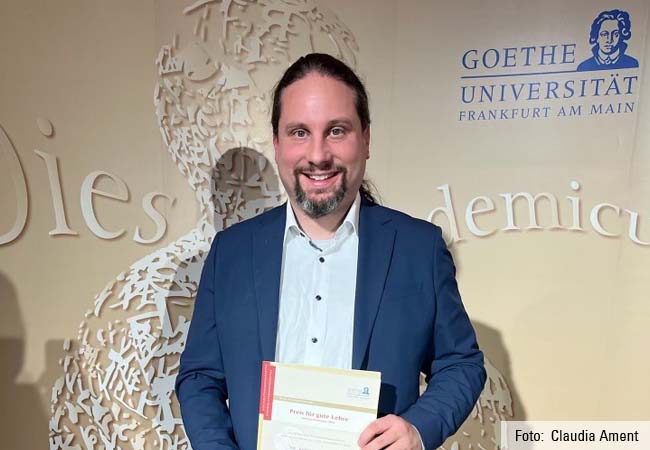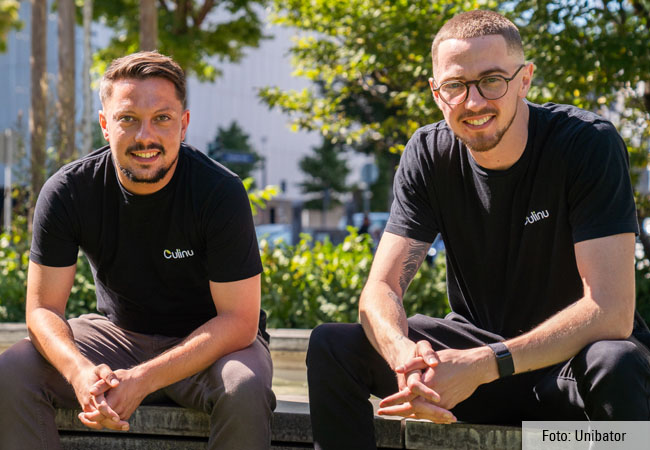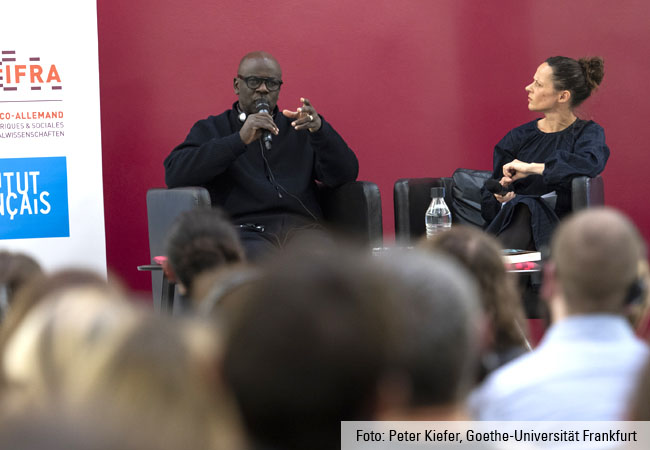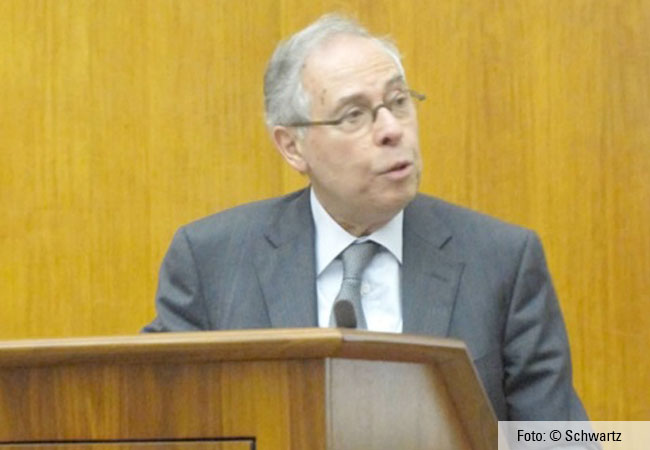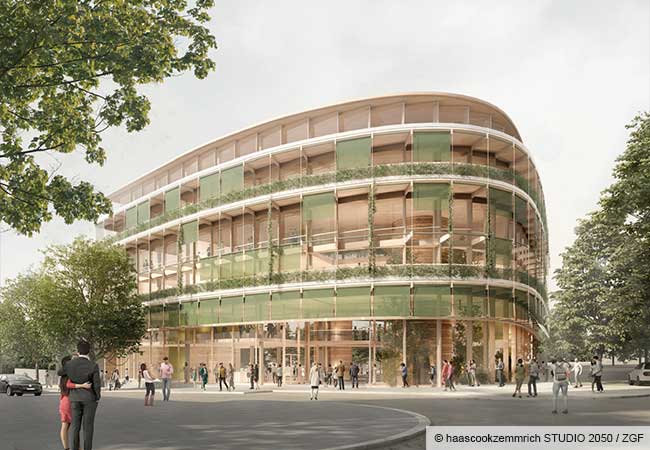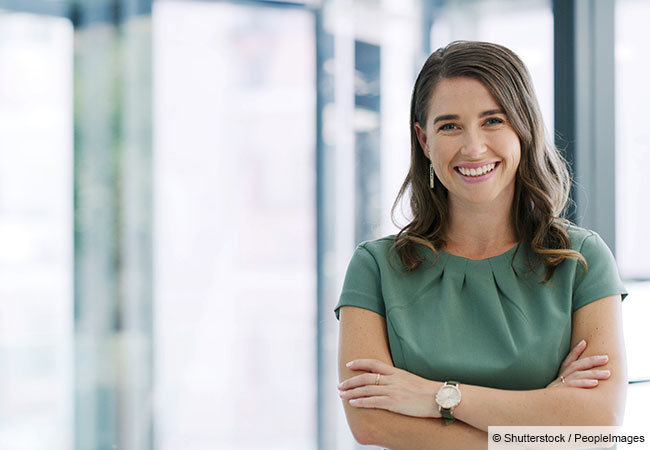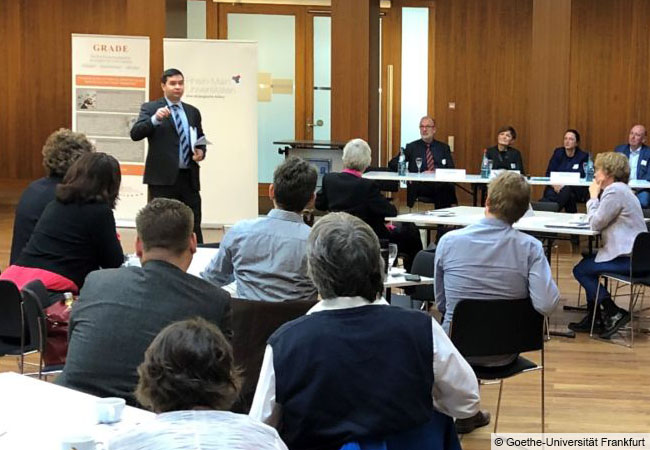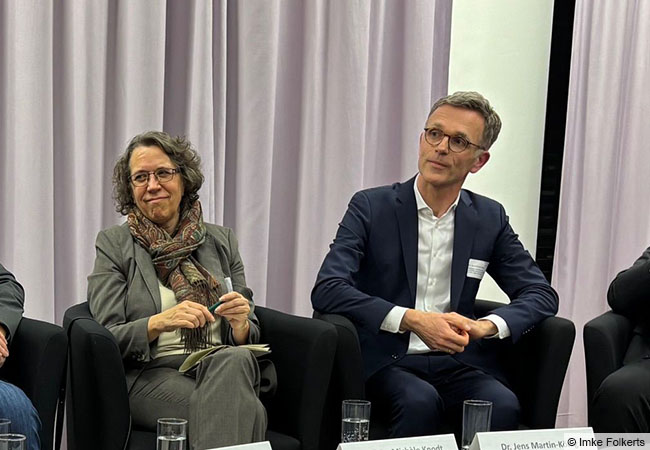Ilona Klemens became the new chaplain of the Protestant Student Congregation (Evangelische Studierendengemeinde, ESG) in spring 2024.
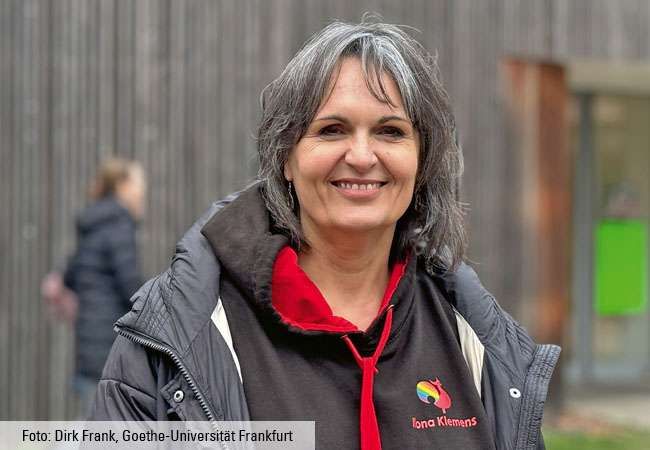
Shortly before being interviewed by UniReport, Ilona Klemens met with an old Muslim friend at Goethe University’s ecumenical meeting place “Haus der Stille”. It is clear that Klemens enjoys the religious and cultural diversity of an institution like Goethe University Frankfurt. Indeed, the new chaplain of the ESG Protestant Student Congregation can justifiably be called an ambassador of interreligious dialog: She is a co-founder of Frankfurt’s Council of Religions (Rat der Religionen), and has served as secretary general of the German Coordination Council of Christian-Jewish Cooperation (Deutscher Koordinierungsrat der Gesellschaften für Christlich-Jüdische Zusammenarbeit), which awards the Buber-Rosenzweig Medal. That does not mean, however, that Ilona Klemens is a naive seeker of harmony; she is fully aware that the ideal of a peaceful and constructive interreligious exchange is being severely put to the test right now by the Middle East conflict. She emphasizes: “We have to ensure that the conflict being played out in the Middle East, with all its violence, destruction and many casualties, does not make it impossible to have any dialog at all. We cannot solve that conflict here. But this is where we live together and we need spaces where we can talk about it openly and candidly. Personally, I believe that religion should not be misused to further violence against or the humiliation or dehumanization of others. Religions should be peacemakers, and never fire-raisers.” A series of interreligious events was launched this past November, including common readings of the Bible and the Koran, visits to a mosque and the Westend Synagogue, and will also include Holocaust Remembrance Day in January. In addition, a photo exhibition on Jewish life in Germany will be on display in the premises of both the ESG and the Catholic University Community (Katholische Hochschulgemeinde, KHG). Beyond the Middle East, Klemens is also worried by Christian nationalism as preached by evangelicals in the U.S. “These are no small-sized groups, they unite millions of Christians who apparently see no contradiction between faith and nationalism. To me, the two are mutually exclusive. We can’t use that kind of religion if we want to protect democracy and human rights.” The recently published ESG Mission Statement states clearly: “Unser Kreuz hat keine Haken. Wir wollen Herz statt Hetze… Antisemitismus und Rassismus sind keine Meinungen.” [Editor’s note: The first sentence is a German word play involving the words cross (“Kreuz”), hook (“Haken”) and swastika (“Hakenkreuz”). Literally translated, it says: “Our cross has no hooks, i.e. it is no swastika. We want heart instead of hate… Antisemitism and racism are not opinions.”]
New experience, new formats
Today Klemens is firmly established in Frankfurt, and this although upon leaving school, her credo was “Just get up and go,” she recalls with a smile. Born in Mommenheim in 1965, she studied in Mainz, Bonn and Munich, earned a Master of Theology in Chicago, and after the practical church internship she lived in South Africa for three years. She spent several months on study visits in both Israel and Lebanon. Moving around a lot brought her into contact with very varied forms of religious and cultural coexistence – experiences she would also like to feed into her work. That being the case, Klemens emphasizes that her main focus are the “traditional” tasks of a university chaplain, i.e. pastoral care and worship services. “People experiencing a crisis can contact me, and I consider it my job to offer spiritual help.” The ESG’s advisory and support services, which are also available to international students, are also very important to Klemens. The church services held in Siolistraße include a sermon and congregational singing, whereby the music chosen is (more) modern. “I think it’s really great that there is so much space for experimentation at the university.” The film club meets on Tuesday evenings and also tackles series like “The Chosen”, a modern and not uncontroversial adaption of the life of Jesus. But Klemens would also like to introduce new formats such as “Dinner Church”, with which she gained good experiences while working as a university chaplain in Mainz. This follows the tradition of the earliest Christian communities, who did not have church buildings. At “Dinner Church”, people gather around a table, cook and eat together, celebrate a service of prayer, and sometimes also Holy Communion. “Formats with food are very popular with students,” Klemens says, adding that the practice of blessing is also gaining popularity and valued as something tangible, which one can take away into everyday life. “Right now, I’m trying out a new format called #BlessMyMess. On several Wednesday evenings throughout the semester, I offer a short service of prayer in Haus der Stille. It’s an opportunity to come together and review the week, combined with a personal blessing.”
Critical discourse
Klemens finds it important to open the church up to new sociopolitical topics. Is she not concerned that this might rock the religious foundations? “Bible texts always have to be read and interpreted anew. That’s the principle of exegesis. We discover aspects that surprise us. Our exhibition “G*d m/f/d – gender diversity since Biblical times”, on display at the ESG since November, doesn’t simply read something into the old texts. One learns that for a long time, the Protestant Church also hid and ignored a lot in the field of gender relations – aspects that are now clearer to see.” Being close to academia, to critical discourse, also shapes her job as a university chaplain, Klemens says, adding that she would like to intensify the existing contacts with other theological faculties. “At the last introductory event for theology and religious studies, I told the new students, ‘You will be taking an academic approach to religions, and here at the ESG you can also live your faith – there is no contradiction in that.’ She believes theology belongs at a university, because during their studies, students learn methods that also play a role in other disciplines. “The object of our study may not be scientifically provable but, strictly speaking, that is also true of other humanities subjects,” Klemens emphasizes.
She is grateful that Goethe University considers religion a part of culture and part of diversity. “The Haus der Stille demonstrates that there is a place for dialog between religions – and also a place for people who are not religious. I’m convinced that if we keep up our dialog, those who would like to simplify and polarize this world stand no chance at winning.”


